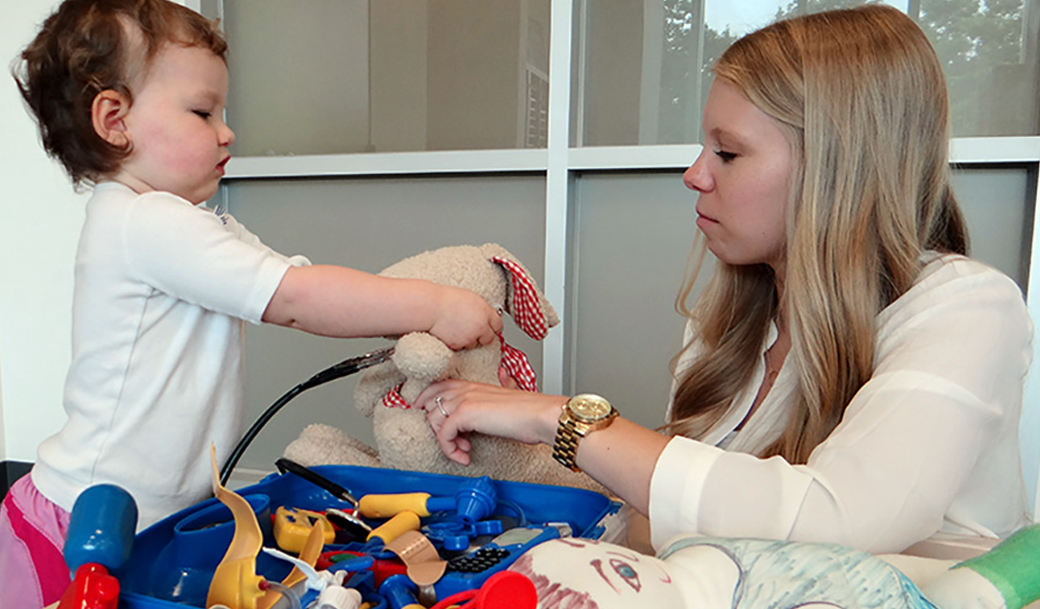Helping children understand health care
The TU hosted "Animal Clinic" puts children in the role of health care professional to help give medical care to stuffed animals
By Kathleen Crostic on March 27, 2018

As a current employee of Towson University and a 2006 graduate, I’m lucky to be an alum that gets to see, first hand, the growth and changes that take place at TU. I’m still adjusting to the entire side of campus called West Village, which, when I was here, was simply a parking lot. And now, a brand new science building is being constructed next to Stephens Hall. Physical changes and new buildings, however, are just one way that TU has grown. As I’ve mentioned in many of my previous posts, one change over the past two years has been a shift to better support collaborations and partnerships, as indicated through BTU: Partnerships at Work for Greater Baltimore.
Through the BTU framework, my colleagues and I work to capture, align, and support the work taking place between TU and our partners throughout Maryland. It has been extremely enlightening to become aware of all of the great work that TU faculty, staff, and students are doing, alongside partners, to improve the quality of life of our neighbors throughout the region. One of the specific partnerships that I have recently become aware of is called the “Animal Clinic.” And, yes, it’s as cute as it sounds, but also impactful.
The Animal Clinic
Shortly before graduating from TU, my department, the Department of Family Studies and Community Development in the College of Liberal Arts, launched a Child Life Track with the option to complete both undergraduate and master’s degrees in Child Life, Administration, and Family Collaboration. These degrees prepare students to become Certified Child Life Specialists (CCLS). What exactly is “Child Life”? Great question. CCLS’ are pediatric health care professionals that work in healthcare settings with children and their families to help them cope with hospitalization, illness, or disability through age-appropriate activities including therapeutic play. I hadn’t thought much about Child Life since graduating, until a recent BTU support request came to us, asking to purchase supplies for an “Animal Clinic” being hosted at the University Child Care Center in April.
The Animal Clinic is an interactive, educational activity, in which children take on the role of a health care professional, while providing medical care to a stuffed animal (often a teddy bear). With help of five child life graduate students, children are guided through the following stations to provide care to their animals:
- Weight and Measurement: Scales and tape measures are used to measure and document the length, height, weight, wing-span, etc. of their animal
- Hospital Bracelet: Children create the name of their animal and identify the medical issue (sore throat, flu shot, hurt knee, etc.)
- Check-Up: Children are provided with guided and free play time with pretend and real medical equipment to allow children to explore and rehearse doctor appointments with their animal
Following the Animal Clinic, each child goes home with their animal as well as age-appropriate books to prepare them for doctor, dentist, and hospital visits. For children, routine medical exams and immunizations can be stressful. The ultimate goal of the Animal Clinic is to expose medical experiences through play in order to decrease negative feelings and stress around future medical visits and exams.
Cross-Campus Collaboration
The Animal Clinic is an ongoing partnership that facilitates multiple opportunities for collaboration around practicums, class engagement, and research projects. In the case of the Animal Clinic, TU students responsible for facilitating the program are given the opportunity to engage in the experiential educational opportunity to apply and build upon their knowledge in the field of child life, meanwhile, the children participating are increasing their sense of autonomy and understanding regarding medical interactions while decreasing any pre-existing negative associations.
This program is a great example of BTU: Partnerships at Work for Greater Baltimore. Even though both partners involved reside on campus, the interaction is taking place with, and ultimately improving the lives of, children from our surrounding communities. I continue to be impressed by the positive impacts that TU faculty, staff, and students have on our communities, whether it be though the Animal Clinic, the Towson Theatre Infusion program, or through any of TU’s other 190 partnership engagements.